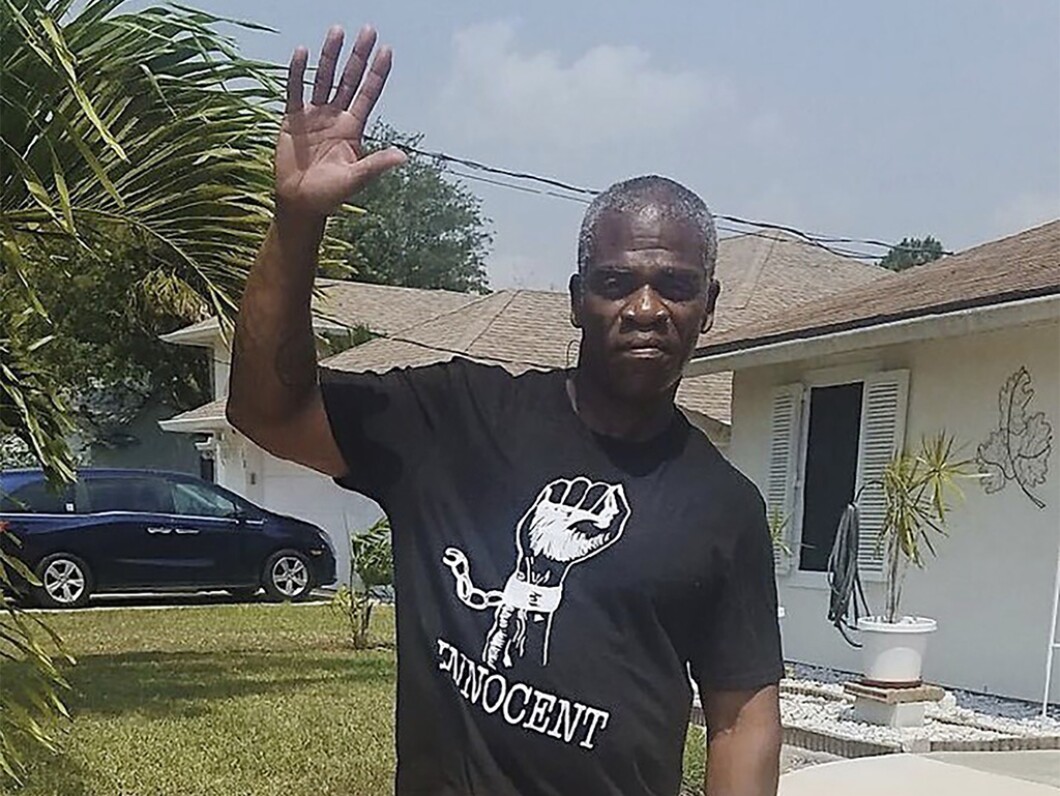
A Georgia sheriff’s office has released the dashboard and body camera footage of a white deputy fatally shooting Leonard Allan Cure, a 53-year-old black man who had been wrongfully imprisoned in Florida for 16 years, during a traffic stop.
Cure, who was coming back from visiting his mother in Port St. Lucie, Florida, was released from prison three years ago and exonerated in a 2004 armed robbery case. The state of Florida apologized to him two months ago.
JIM JORDAN WON’T HOLD THIRD BALLOT, WILL BACK TEMPORARY POWERS FOR MCHENRY
Cure was stopped Monday around 7:30 a.m. along Interstate 95, just north of the Florida-Georgia border, for allegedly driving more than 90 mph in a 70 mph zone by Sheriff’s Deputy Buck Aldridge, who has been put on administrative leave while the incident is being investigated.
The Camden County Sheriff’s Office had been hesitant about releasing the body camera footage but said Wednesday it decided to make the videos available for public review in an effort to be “completely transparent as to what happened, and how the incident escalated to the point of extreme Use of Force.”

Cure’s family viewed the video before it was posted online. Relatives said they thought Cure resisted being arrested because of the psychological trauma from spending 16 years behind bars for a crime he didn’t commit.
“I believe there were possibly some issues going on, some mental issues with my brother,” Cure’s brother, Michael, told the Associated Press. “I know him quite well. The officer just triggered him, undoubtedly triggered him. It was excitement met with excitement.”
The dashboard footage shows Cure’s white truck driving by Aldridge’s police vehicle. As the deputy’s car gets into the lane behind Cure, Cure puts his right signal on but turns it off when the cars in front of him move over to the right lane. Aldridge gets behind Cure and turns his lights and sirens on. Cure pulls over to the right side of the interstate.
The video, posted on YouTube, shows the deputy shouting several times for Cure to get out of his vehicle. He does but, at first, refuses to comply with a command to put his hands on the back of the truck.
“I ain’t doing s***,” Cure told the deputy, who responded, “Get your damn hands back here.”
Cure then asked the deputy his name, and when Cure identified himself, Aldridge said, “I don’t care. Step to the rear of this vehicle.”
Cure complied after the deputy threatened to use a stun gun on him. With his hands on the truck, Cure questioned why he was pulled over.
“You passed me doing 100 miles per hour,” the deputy replied.
Cure responded, “OK, so that’s a speeding ticket, right?”
Aldridge said, “Sir, tickets in the state of Georgia are criminal offenses.”
Aldridge then told Cure to put his hands behind his back and told him he was going to jail before tasing him again while continuing to shout, “Put your hands behind your back.”
Cure then turned around and started flailing his arms, trying to get away from the wires attached to the stun gun. Cure grabbed Aldridge, and both men had their arms around each other’s necks. Cure started to push the deputy’s face and forced his head backward. Aldridge then took his baton and hit Cure with the side of it, but Cure maintained his grip.
“Yeah, b****!” Cure can be heard saying.
A single pop is heard next, and Cure slumped to the ground. Aldridge, still holding the gun, shouted to Cure to stay on the ground and then radioed dispatch.
“Shots fired! Suspect down! Send help!” Aldridge said.
Georgia Bureau of Investigation has launched an investigation into the shooting death and will send its findings to Brunswick Judicial Circuit District Attorney Keith Higgins, who will decide if any charges will be filed against the deputy. Higgins met with Cure’s family before the video was publicly released.

After watching the video, Cure’s relatives said they still believed the shooting was unnecessary.
Civil rights attorney Ben Crump, who is representing the family, claimed Aldridge had acted aggressively from the start and never did anything to deescalate the situation.
After his release from prison three years ago, Cure spent his days giving inspirational speeches to high school students, working as a security guard, and pondering going to college to study music production.
“Sadly, his life was cut tragically short,” Innocence Project of Florida Executive Director Seth Miller said in a statement. The group, which worked to overturn Cure’s conviction, added the state of Florida had apologized to Cure in August and that he had received $817,000 in compensation. He was also on track to receive college tuition. Cure had closed on a house in Palmetto, Georgia, a week before he was shot and killed.
“He was on an upward trajectory, and to see that cut short, it’s just really devastating,” Miller said. “And it’s hard to believe that it’s happened.”
Cure was the first person exonerated by the Broward County State Attorney’s Office’s conviction review unit, which was launched in 2019.
CLICK HERE TO READ MORE FROM THE WASHINGTON EXAMINER
He was convicted of robbing a Walgreens in Dania Beach, Florida, even though he had an alibi and there was no physical or forensic evidence against him. Cure unsuccessfully appealed his conviction four times on his own.
“The Leonard we knew was a smart, funny, and kind person,” Broward State Attorney Harold Pryor said in the statement. “After he was freed and exonerated by our office, he visited prosecutors at our office and participated in training to help our staff do their jobs in the fairest and most thorough way possible.”







